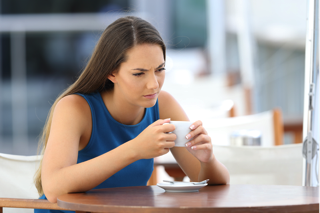
Most everyone has heard of SAD, or Seasonal Affective Disorder, when winter brings on chronic blues. But if you feel better in winter than summer, you may have summer SAD, also called reverse SAD. While the jury is still out on the causes of summer SAD, there are ways to get through the season with more energy, better sleep, and improved mood.
Although both winter and summer SAD and summer SAD share symptoms of sadness and anxiety, they diverge in potential causes and remedies.
Winter SAD commonly involves sadness and anxiety, sluggishness, weight gain, oversleeping, cravings for high-carb foods, social withdrawal, and a loss of interest in typically enjoyable activities.
While summer SAD also causes sadness and anxiety, it differs from winter SAD by causing the following:
- Agitation and irritability
- Weight loss
- Insomnia
- Feeling overheated at night
- Loss of appetite
- Increased suicidal ideation
- Increased sex drive
While five percent of the population suffers from winter SAD, researchers estimate roughly one percent suffer from the summer version, and women with summer SAD outnumber men two to one.
Both are considered major depression with seasonal patterns.
Spring and summer depression can be especially hard to cope with because sufferers feel very out of step — everyone is happier when you’re more miserable.
Suicide is a concern with summer SAD as suicide is more of a concern when people are depressed and agitated rather than depressed and lethargic.
Are the causes for winter and summer blues the same?
Most theories regarding the cause of the winter blues — what most of us think of as SAD — stem from the fact that short winter days reduce our exposure to daylight, leading to an increase in the hormone melatonin. This can negatively affect our body’s circadian rhythm, or sleep-wake cycle, as well as brain hormones that affect mood, motivation, and appetite.
Support for this theory comes from the overwhelming success of morning light therapy in the winter. When the brain is exposed to natural light in the morning, it helps regulate the circadian rhythm, improving sleep, energy level, and mood.
The causes for summertime SAD however, are not yet clear. The theories below are being studied, but a consensus has yet to be reached.
Allergies. Some patients report worse symptoms on high-pollen days.
Possible genetic component. More than two-thirds of patients with SAD have a relative with a major mood disorder.
Hypothalamus. Some scientists believe the root cause could lie in the brain’s hypothalamus, our brain’s control center for hormones.
Changes in light. While winter SAD has been linked to decreased light, summer SAD may be related to longer days and increased light offsetting the circadian rhythm by activating the body’s melatonin response at the wrong time of day.
Heat and humidity. Sensitivity to heat and humidity may come into play, including in areas with milder summers, although incidences go up in hotter areas.
Study subjects with summer depression were shown to experience a significant increase in body temperature at night compared to non-sufferers. When they were wrapped in cooling blankets at night their temperatures dropped and their symptoms disappeared. As soon as they went outside into the summer heat, their depression returned.
Without a known cause, how do I manage my summer SAD?
While the causes for summer SAD are not yet decided, here are some tools to help you cope with those summertime blues:
Early morning sunlight. Get 30 to 60 minutes of early morning sunlight as often as possible to help shift your body clock into the proper circadian rhythm.
Blackout curtains. Install these in your bedroom during the summer to mimic the cool dark of winter nights.
Open bedroom windows at night. This will improve air flow and keep room temperatures lower for improved sleep.
Sunglasses. Avoid bright light by wearing sunglasses outside the house. Even on cloudy days there is substantial exposure to sunlight. At higher latitudes, the blue light spectrum is more prevalent, making cloudy days have more glare.
Avoid blue light and screen light in the evening. This helps the body to adjust its hormone production in preparation for a proper sleep cycle. Some patients find wearing blue-blocker glasses and installing the f.lux app on phones and computers also helps immensely.
Cool your bed. While cooling therapies are not guaranteed to be permanent fixes, the temporary help can make a big difference in sleep quality. You can use low-tech solutions like frozen water bottles in your bed or opt for more high-tech solutions like a cooling pad or bed fan.
Check thyroid levels. Some evidence suggests those with summer SAD have low thyroid function, which can affect temperature regulation, mood, sleep, appetite, weight, energy, and more.
Exercise daily.
Eat an anti-inflammatory diet.
Eat plentiful and varied produce. This will support your healthy gut bacteria and help support production of neurotransmitters to support brain health and mood regulation.
If you suffer from summertime SAD, contact my office to find out how you can reclaim your energy, appetite, and mood.



Latest from the Blog
The Dirty Dozen
August 19, 2024The “Dirty Dozen” is a list of fruits and vegetables, compiled by the Environmental Working Group (EWG), that you should always eat organically. These produce items are not only delicious and nutrient-rich but also tend to carry high levels of pesticide residues when grown conventionally. By opting for organic versions, you can significantly reduce your […] Read more
Latest from the Blog
3-Day Detox Plan
Here’s a 3-day detox meal plan tailored to be autoimmune-friendly and compliant with functional medicine principles. This plan emphasizes anti-inflammatory, nutrient-dense foods while avoiding common triggers for autoimmune symptoms. Day 1 Breakfast: Green Smoothie Bowl Ingredients: Spinach, kale, cucumber, green apple, avocado, coconut milk, chia seeds. Why: Spinach and kale are rich in vitamins A, […] Read more